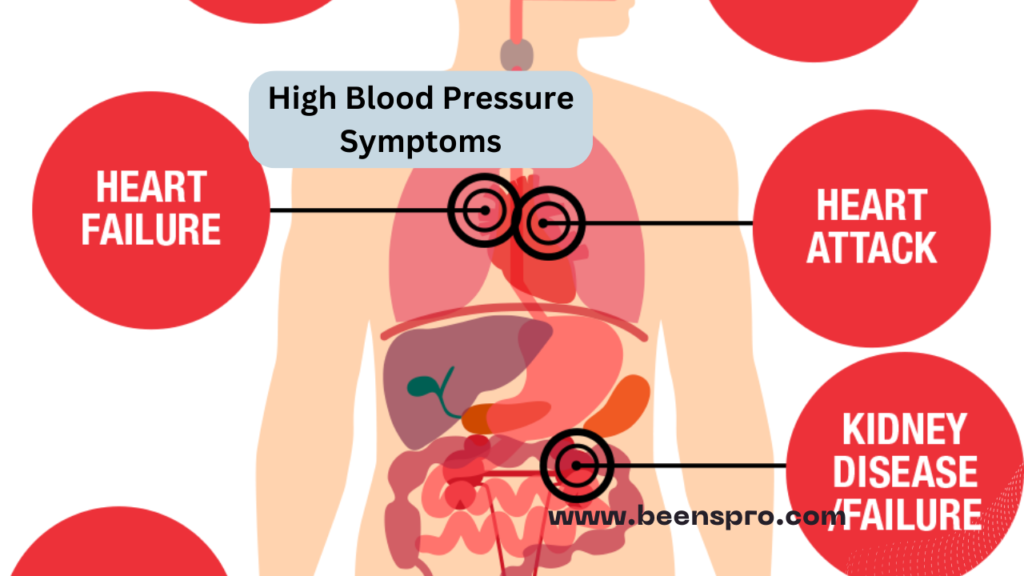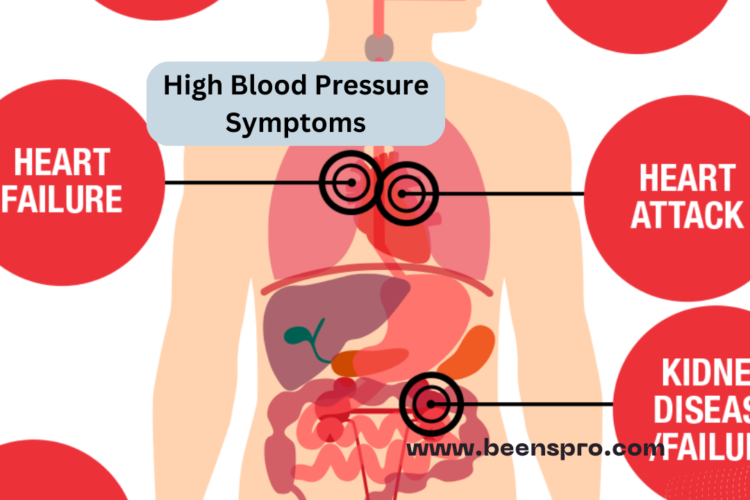
High blood pressure, also known as hypertension, is a common condition that affects millions of people worldwide. It occurs when the force of blood against the walls of your arteries is consistently too high. Often, hypertension symptoms may not be noticeable until the condition has progressed, which is why it’s crucial to understand the high blood pressure signs early. This article will explore the common blood pressure symptoms, the causes behind them, how to diagnose and treat hypertension, and provide actionable insights to manage and prevent this potentially life-threatening condition.
What Are the Symptoms of High Blood Pressure?
Recognizing the symptoms of high blood pressure can be challenging because many people with hypertension may not show noticeable signs. In fact, high blood pressure is often called the “silent killer” because it can cause damage without symptoms. However, there are some common and severe signs that can alert you to its presence.
Early Warning Signs of High Blood Pressure
The early warning signs of high blood pressure can be subtle, but being aware of them is essential. Some people experience frequent headaches, especially in the morning. Others may feel dizziness, shortness of breath, or even blurred vision. These symptoms are not always directly linked to high blood pressure, but if experienced frequently, they may indicate that elevated blood pressure is at play.
Early detection through blood pressure measurement is essential to prevent more serious complications. Elevated blood pressure can silently damage blood vessels, leading to long-term health issues like heart disease, kidney problems, and stroke.
Severe Symptoms of Hypertension
If high blood pressure is left untreated, it can lead to a hypertensive crisis, which can cause severe symptoms. This includes chest pain, nausea, confusion, and even nosebleeds. A sudden spike in blood pressure can cause damage to the blood vessels, heart, and kidneys, leading to a medical emergency.
Recognizing severe hypertension symptoms early can be a matter of life or death, and immediate medical attention is crucial. If you experience any of these signs, it’s important to consult with a healthcare provider immediately.
How to Diagnose High Blood Pressure Symptoms?
Understanding how high blood pressure is diagnosed is key to managing it effectively. Diagnosing hypertension usually involves blood pressure measurements, which can be taken at a doctor’s office or at home with a blood pressure cuff. A diagnosis of hypertension is made when blood pressure readings are consistently high over some time.
The Role of Blood Pressure Monitoring in Diagnosis
Regular blood pressure monitoring is the best way to keep track of whether your blood pressure is within the normal range. If you’re concerned about your blood pressure symptoms, home monitoring is an easy and effective way to check it regularly. There are various devices available for at-home blood pressure measurements, but it’s always important to consult with a doctor if your readings consistently fall outside the recommended range.
Proper diagnosis also includes knowing how to interpret blood pressure readings. A normal blood pressure is typically around 120/80 mm Hg, while a reading higher than 130/80 mm Hg may indicate hypertension.
Why Early Diagnosis of Hypertension is Crucial
Early diagnosis of hypertension allows for early treatment and intervention, potentially preventing the condition from progressing to more severe stages. Regular check-ups and proper blood pressure measurements can help detect any fluctuations in your blood pressure readings and lead to early action.
When hypertension is detected early, it can often be managed with lifestyle changes, medication, and regular monitoring. In contrast, if left untreated, high blood pressure can lead to long-term health complications like heart disease, stroke, and kidney damage.
What Causes High Blood Pressure Symptoms?
Several factors contribute to the development of high blood pressure. Understanding these causes is important for preventing the condition and its associated symptoms.
Hypertension and Lifestyle Factors
Lifestyle factors like diet, exercise, and stress are key contributors to high blood pressure symptoms. Hypertension and stress are particularly interlinked, as chronic stress can lead to temporary spikes in blood pressure, which may become permanent over time.
Eating a diet high in salt, processed foods, and saturated fats increases the risk of developing hypertension. On the other hand, eating potassium-rich foods, such as fruits and vegetables, and reducing salt intake can help control blood pressure.
Regular exercise plays a critical role in managing and preventing high blood pressure symptoms. Even moderate physical activity, such as walking, can help keep your blood pressure levels in check.
Genetic Factors and Age-Related Hypertension
In addition to lifestyle factors, genetics, and age also play a significant role in hypertension. As you age, your blood vessels become less elastic, which can increase blood pressure. High blood pressure is more common among people aged 60 and older. If you have a family history of hypertension, you are more likely to develop it as well.
How Can High Blood Pressure Symptoms Be Treated?
Managing high blood pressure symptoms involves a combination of lifestyle changes, medication, and regular monitoring. If left untreated, hypertension can lead to serious health complications, so it’s crucial to take action when symptoms are detected.
Medication Options for High Blood Pressure
There are several blood pressure medications available to help manage hypertension symptoms. These include diuretics, ACE inhibitors, beta-blockers, and calcium channel blockers. Your doctor will help determine the best treatment based on your individual health needs and blood pressure readings.
Medications can be very effective at lowering blood pressure, but they should always be used in conjunction with lifestyle changes, such as a healthier diet and increased physical activity.
Natural Remedies for High Blood Pressure Symptoms
In addition to medication, several natural remedies can help reduce high blood pressure symptoms. Reducing stress, maintaining a healthy weight, and exercising regularly are essential for hypertension management. Consuming foods rich in omega-3 fatty acids, like fish and flaxseed, can also be beneficial for maintaining normal blood pressure levels.
If you’re looking for ways to manage high blood pressure without relying solely on medication, natural remedies such as these can be highly effective when combined with proper medical care.
How to Prevent High Blood Pressure Symptoms?
Prevention is always better than cure when it comes to high blood pressure. By adopting a heart-healthy lifestyle, you can reduce your risk of developing hypertension and its associated symptoms.
The Role of Diet in Preventing High Blood Pressure
A heart-healthy diet is crucial for preventing high blood pressure symptoms. This includes reducing salt intake, avoiding processed foods, and incorporating more fruits, vegetables, and whole grains into your meals. Foods rich in potassium, such as bananas and sweet potatoes, can help counteract the negative effects of sodium and contribute to lower blood pressure.
Exercise and Its Role in Hypertension Prevention
Regular physical activity is one of the most effective ways to prevent and manage hypertension symptoms. Engaging in activities like walking, cycling, or swimming can help improve cardiovascular health and lower blood pressure over time. Aim for at least 30 minutes of moderate exercise most days of the week.
Can Stress Contribute to High Blood Pressure Symptoms?
Yes, stress is a significant factor that can contribute to high blood pressure symptoms. Chronic stress can cause temporary spikes in blood pressure, and over time, these spikes may become permanent. It’s essential to find effective ways to manage stress, such as through relaxation techniques, mindfulness, or exercise.
Conclusion
Recognizing and managing high blood pressure symptoms early is key to preventing serious health problems. Through a combination of regular blood pressure monitoring, lifestyle changes, and medication, you can effectively control hypertension and live a healthy life. Always consult with your healthcare provider for personalized advice and treatment options to manage high blood pressure.
FAQs
What Are the Most Common Signs of High Blood Pressure?
The most common signs of high blood pressure include headaches, dizziness, chest pain, and shortness of breath. However, many individuals may experience no symptoms at all, which is why regular blood pressure measurement is so important.
Can High Blood Pressure Be Managed Without Medication?
Yes, high blood pressure can sometimes be managed without medication through lifestyle changes such as improving diet, increasing physical activity, and reducing stress. However, blood pressure medication may still be necessary for individuals with more severe symptoms.
How Often Should I Monitor My Blood Pressure?
If you have been diagnosed with hypertension, it’s important to monitor your blood pressure regularly, ideally daily or as recommended by your doctor. Keeping track of your blood pressure readings at home can help you stay on top of your health.
What Are the Long-Term Effects of Untreated Hypertension?
Untreated hypertension can lead to serious health complications such as heart disease, stroke, and kidney damage. High blood pressure can also cause vision loss and damage to your arteries over time.
Can High Blood Pressure Symptoms Go Away on Their Own?
High blood pressure symptoms typically do not go away on their own. Hypertension requires ongoing management through lifestyle changes and possibly medication to prevent complications.
